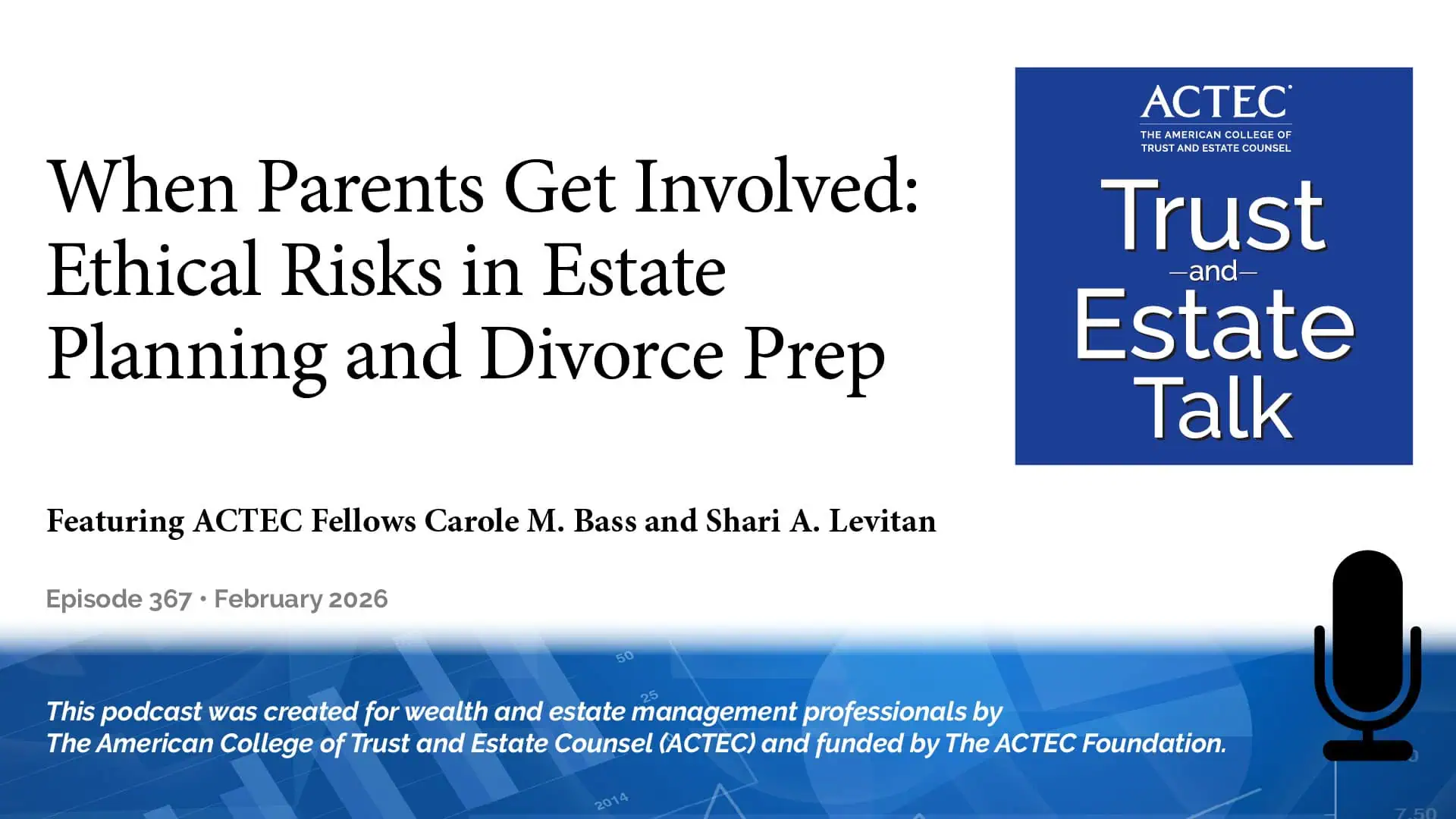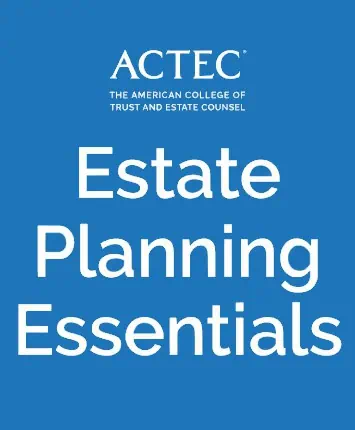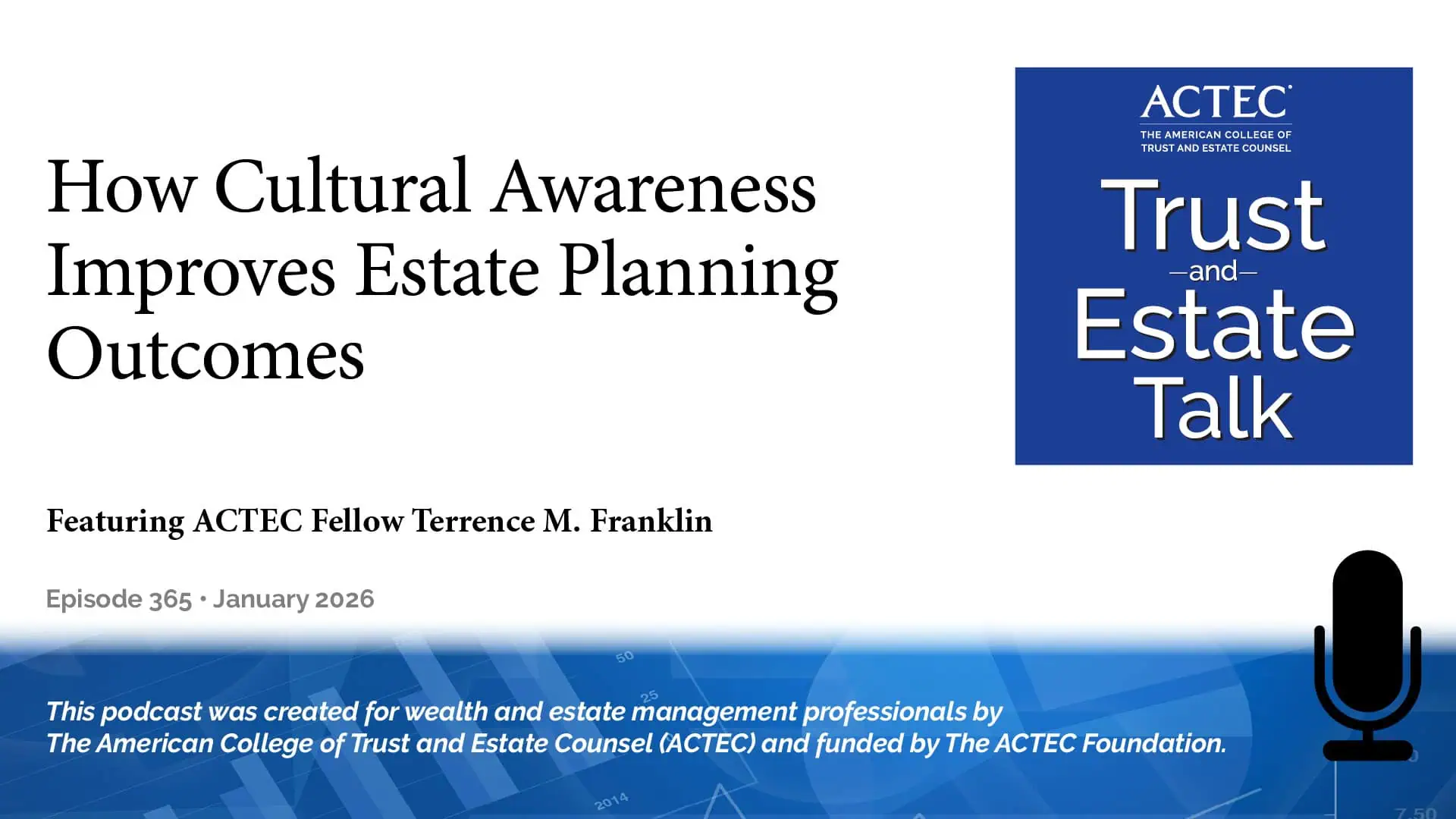The Power of Off: A Book Review
“The Power of Off: A Book Review,” that is the subject of today’s ACTEC Trust and Estate Talk.
Transcript/Show Notes
This is Toni Ann Kruse, ACTEC Fellow from New York City.
In 2016, author Nancy Colier shared her latest book, The Power of Off: The Mindful Way to Stay Sane in a Virtual World. Her words rang loud and clear as work-life balance adapted to the COVID pandemic and today’s working norms. As Ms. Colier explains, how we spend our time, what motivates us, and what we want, are all on a radical course of transformation.
ACTEC Fellow Sandra Perkins of Seattle, Washington, offers a review of the book and the takeaways she is now using in her professional and private life. Welcome, Sandra.
Thank you, Toni Ann. I recently read a terrific book called The Power of Off: The Mindful Way to Stay Sane in a Virtual World, by Nancy Colier. The Power of Off discusses the many impacts of technology on our mental, emotional, and psychological health, and our overall quality of life. Because the author is a psychotherapist, she has a unique perspective on how technology affects our lives.
Technology is a valuable tool, but too much dependence on technology is harmful to our mental health, our relationships, and our life experiences.
Technology as an Escape from the Present
Are we using technology to escape discomfort in the present moment?
Ms. Colier notes that humans have been finding ways to escape the present moment since the beginning of time. After describing some common ways people avoid the present moment, such as alcohol and recreational drugs, she observes, “What’s different now, in the age of technology, is profound and profoundly alarming: our method for escaping the present moment is shared, societal, and considered a reasonable way of living. The way that addicts use their drugs of choice is the way we normal folks use technology.”
Ms. Colier offers 11 questions to help us assess the impact of technology on our lives. Here are a few of those questions:
- Do you want to cut down on your device use but find you are unable to do so?
- Do you feel negative emotions– such as agitation, irritation, depression, anger, exasperation, boredom, etc.–when you can’t use your device?
- Have real-world activities– such as hobbies, sports, community involvement, reading books, learning, and so forth–decreased as a result of your time spent online?
- Have your social relationships in the real world diminished or suffered as a result of your online behavior?
- Do you crave a more meaningful life and believe that technology may get in the way of it?
Answering even one or two of the questions “Yes” shows a need for change in our lives.
Off the Grid
Ms. Colier notes that the desire to be unplugged from technology has fueled an entire travel industry. “We will go far and wide and pay huge fees to put ourselves in places that force us off the grid. Some of the most expensive destinations on the globe charge us for the opportunity to live temporarily in a world without technology.” These trips are essentially rehabs without therapy, and people plug right back in when they return home.
Managing Technology in Our Lives
Technology will always be part of our lives, and we will all use it to some degree. Ms. Colier writes: “This is not a book about the concept of technological addiction or any imaginary user. Quite the contrary: it is about you and your personal experience, the quality of your life, what is important, and how you want to live and thrive. Do you personally need to address your use of and relationship with technology?”
So, if we need to make changes in our relationship to technology, what do we do? That question is best answered by another question. How do we want to live our lives?
We have choices here. For example, many of us believe we must be available to be reached 24/7. “Relentless availability creates relentless stress.” Schedule time daily to be completely unavailable to others.
Are you using technology to escape boredom? Are you losing the ability to engage yourself, to imagine and create? Are you losing the ability to do things for yourself as dependence on technology increases?
In interpersonal relationships, are you unable to give your full attention to the person in front of you? Having a phone or other device on the table or within reach is detrimental to human connection. When you are with others that you care about, turn off your devices, or better yet, leave them completely out of sight.
We need to ask for the attention that we all still need. Ask your friend or partner to put away their devices and be present with you in the conversation.
Choosing to text instead of conversing in real time, either in person or by phone, leads to shallow relationships. If you are craving connection, converse in person or in real time by phone.
When you have conversations with people you care about, do you remember what they told you and ask them about it the next time you see them? “Absence of continuity” is much more common these days, and it leads to shallow relationships. Listen to what people are telling you and remember what they say. That is critically important to human relationships.
If we want to experience life in the real world, we need to put away our devices and re-enter the real world.
Virtual communities cannot offer the same emotional nourishment that physical or real communities can. Research shows that “the more face-to-face interactions we have, the less lonely we are, while the more online interactions we have, the more lonely we are.” No wonder our society is experiencing an epidemic of loneliness.
Tech Balance Tips for Estate Planning Professionals
This is directly relevant to our estate planning practice. The most important part of our practice is the personal relationships with our clients and our colleagues. Technology should never replace the face-to-face meetings and relationships that make our practice such a joy. It is great to have tech tools to fill in when those meetings are not possible, but relationships based on trust must include in-person interactions, or we estate planning attorneys risk becoming fungible commodities instead of trusted advisors.
Do you record every significant event in your life or your family’s life on your smartphone? If so, you may be missing the experience in the moment to obtain that recording. Is that a good trade? Almost certainly not.
Try this experiment: Attend an event that you would normally record, but don’t take any devices. Just throw yourself directly into the experience. “Notice if the lived experience of the event is different when you watch it through your own eyes, without the distraction of the device. Notice too how you hold and integrate the experience going forward and if that feels different from how you hold a recorded experience. “
Ms. Colier writes about clients who show her their lives as recorded on their smartphones. Because their work and social lives happen virtually and so much of their self-identity is crafted online, many feel as if their lives are a simulation of real life, as if they are unreal characters in an online game. These clients ask Ms. Colier, “When is my real life going to happen?”
Ms. Colier writes, “While everything we know is changing, what remains unchanging is what we as humans need in order to be nourished emotionally and spiritually, to feel grounded and connected to ourselves and other people, and to experience meaning.”
We need to retake control of our lives and remember what is most important about being human. We each need to define our own relationship with technology.
If anything in this podcast has resonated with you, I strongly encourage you to read The Power of Off. It could change your life. Thank you.
Toni Ann Kruse: That was excellent. Thank you so much, Sandra, for giving us a little sneak peak of this book, which sounds very interesting and one that I should pick up immediately. Thank you again for your time.
Latest ACTEC Trust and Estate Talk Podcasts

Estate Planning Considerations in Community Property States Relating to Retirement Accounts
Explore how community property laws shape IRAs, 401(k)s, beneficiary designations, and spousal rights in retirement account estate planning.

When Parents Get Involved: Ethical Risks in Estate Planning and Divorce Prep
When parents join prenup or divorce planning, ethical risks follow. ACTEC Fellows explore privilege, conflicts, and protecting the attorney-client relationship.

Useful But Overlooked Trusts: A Planner’s Guide to When and How to Use Them
Explore overlooked trusts—including HEETs, alimony, voting, and blind trusts—and when estate planners should use them to address complex client needs.



